Every book you read, every script you write, and every friend you make will add to your competitive advantage.
Written by: Tulip King
Translated by: Chopper, Foresight News
If you are not good at trading or want to take it to the next level, you need to cultivate a more comprehensive skill set. In the crypto space, most people overlook self-investment, which is evident, but you can definitely build your own competitive advantage.
Learn to Think Independently
In the crypto space, the most unsettling reality is discovering that you lack independent thoughts. You keep refreshing Twitter, waiting for someone with more followers to tell you what to buy; you are not trading, you are just following the crowd, and followers will always be late to every market party.
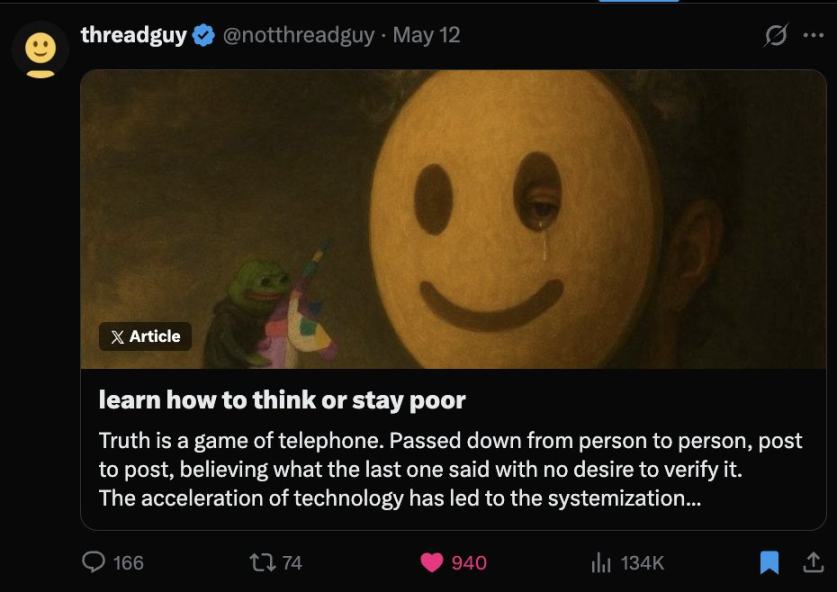
After reading this article, I recommend you revisit threadguy's article on thinking.
This borrowed belief not only leads to poor returns but also poses deeper issues. When you trade based on others' arguments, you are essentially trying to replicate their complete thought model without knowing their underlying logic. You do not know what factors led them to make that trade, you do not understand their risk management strategies, and you certainly do not know when they will change their minds. They might be selling when you buy in, and you only realize it when they post their profit-taking screenshots; I have seen this play out hundreds of times.
For example, someone with unique insights proposes the argument of combining AI with crypto. They quietly build their position, perhaps sharing some initial thoughts, testing their framework with criticism; by the time their belief is strong enough to make a public statement, their position is already established. Then, followers rush in, pushing up the price of their holdings, conveniently providing the liquidity they need to exit. The initial thinker makes money not because their technical judgment is correct, but because they understand the rules of information dissemination.
The solution is not to find more reliable people to follow but to cultivate your own independent thinking ability. This may sound abstract, but there are traces to follow.
Read More
Original thinking in the market comes from exposure to unique information sources and processing it through your own analytical framework.
We are all reading the same popular tweets and the same Substacks, which are shared in the same Telegram groups. This creates an echo chamber effect where everyone has the same information. When everyone has the same information, no one can have a competitive advantage.
Real opportunities are hidden in niche corners. For example, Jacob's 2022 article "Hyperstructures," which most people have not read, almost predicted the current comprehensive recovery of DeFi; or Pierre Rochard's 2014 article "Speculative Attack," which explained the game theory behind Bitcoin adoption and continues to influence the market a decade later. These are not just good articles; they are analytical frameworks that can help you foresee future market trends.
Go read a book like "Reminiscences of a Stock Operator." I guarantee that by broadening your reading sources and types, you will gain something; I also dare say that no matter how much you read now, it is still not enough. Stuff as much information into your brain as possible; it will only do you good, not harm.
At the same time, do not limit your reading to the crypto field. Reading Semi Analysis's analysis of TSMC's competitive moat can help you understand the linkage between the tech industry and crypto; Luke Gromen's research on the dynamics of the dollar system can explain why Bitcoin rises at specific times better than any on-chain analyst; if you want to judge what Trump could or could not achieve during his term, read Curtis Yarvin's article on the power structure of the U.S. government.
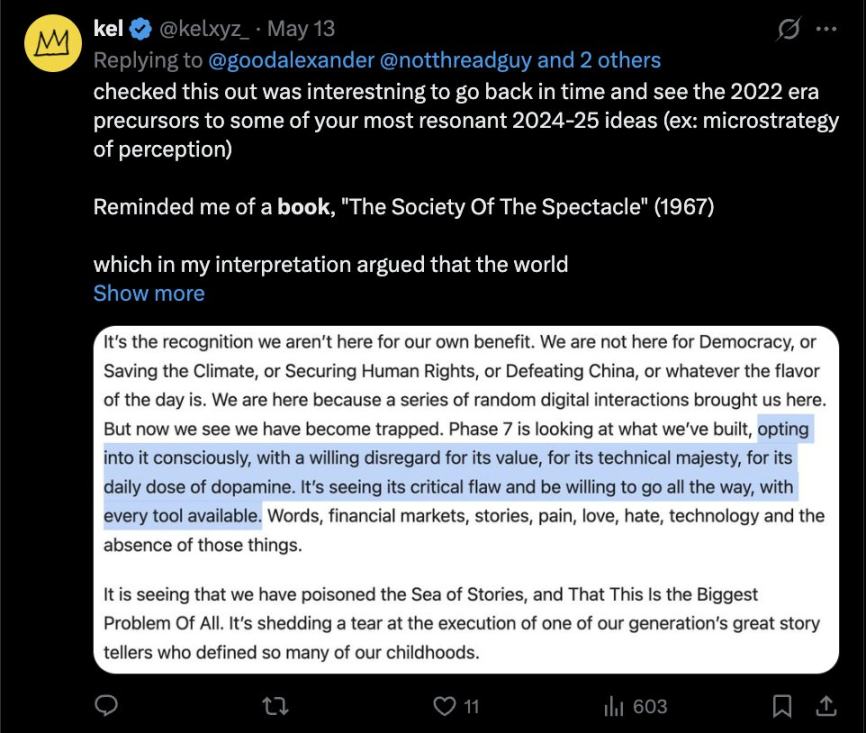
Kel even reads books from the 1960s to find opportunities.
The compounding effect of diverse reading is astonishing. When you understand the logic behind yen arbitrage trading, you suddenly grasp why crypto might drop at specific times; when you study how luxury brands create artificial scarcity, you can see through the tricks before NFT plays become popular; when you know how Nvidia allocates H100 chips, you can discern which AI tokens have real computational power backing them and which are just marketing gimmicks.
Additionally, make sure to read project documentation; at the very least, know what you are buying.
Write More
Writing is visualized thinking. Those seemingly brilliant trading arguments of yours will expose their flaws once you try to write them down clearly. Writing forces you to confront "logical gaps," "unverified assumptions," and "unestablished connections."
I started writing long analyses not to attract readers but to clarify my thoughts. When you write down why you are bullish on an asset, you can no longer use vague reasons like "it feels good" or "the community is positive" to brush it off. You must clearly identify specific catalysts, recognize real risks, and set clear stop-loss points. Just this process can help you avoid 90% of bad trades.
Stick to writing, and miracles will happen. Your brain will start processing information differently, constantly seeking out connections and patterns worth exploring, gradually forming what I call "argumentative thinking," which can spot trends before they become consensus in tradable narratives. This is a pattern recognition ability cultivated through repeated practice.
Learn to Use Data
Blockchain is the most transparent financial system in history; every transaction, every wallet transfer, and every smart contract interaction is publicly traceable. Yet most traders only look at three charts on CoinGecko and claim they have done their research.
The information asymmetry in the crypto space does not lie in access channels (everyone can see the same data) but in the ability to interpret and integrate that data, in asking better questions, and knowing where to find answers.
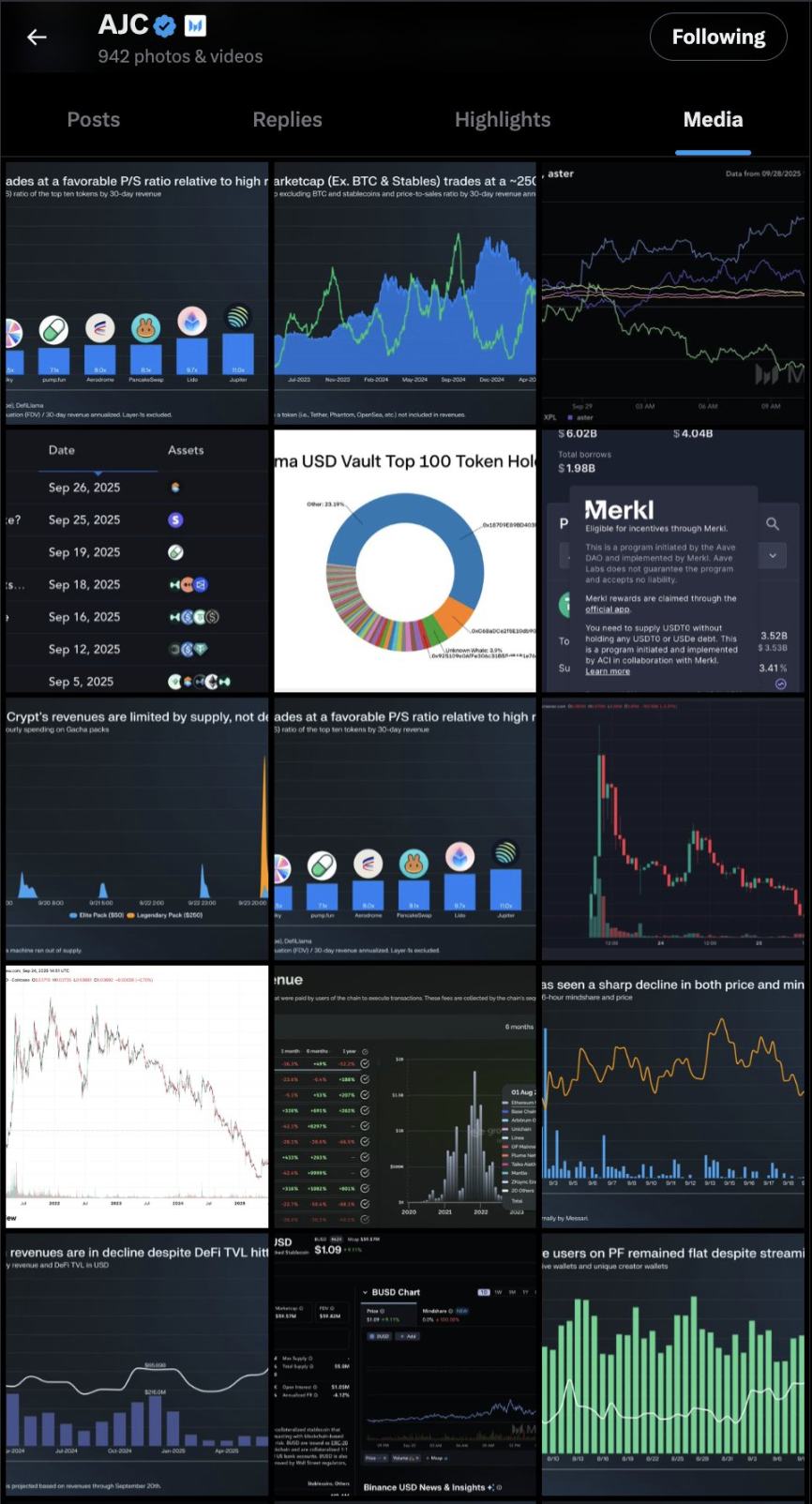
Just look at Average Joe's Twitter profile to see how dedicated he is to finding data that supports his arguments.
Take yield analysis as an example: DeFi protocols generate real fees, real yields, and real return rates, but most traders will wait for others to calculate these figures and organize them into pretty dashboards. Anyone who can write basic SQL queries in Dune can calculate a protocol's yield before the data even makes it to DeFi Llama; they can spot trends weeks before they become Twitter topics.
Learn to Program
Everything in the crypto space is programmable, and this understanding should fundamentally change the way you interact with the market. We are not trading on the New York Stock Exchange; we do not need Bloomberg terminals or institutional access: every protocol has an API, every contract can be called directly, and every strategy can be automated.
Start simple: write a script that checks mining yields every hour, create a tool that alerts you when a specific wallet trades, or build a basic market-making program that provides liquidity near your spot position. These are not complex codes; ChatGPT can write most of them. But they can upgrade you from manual clicking to trading at internet speed.
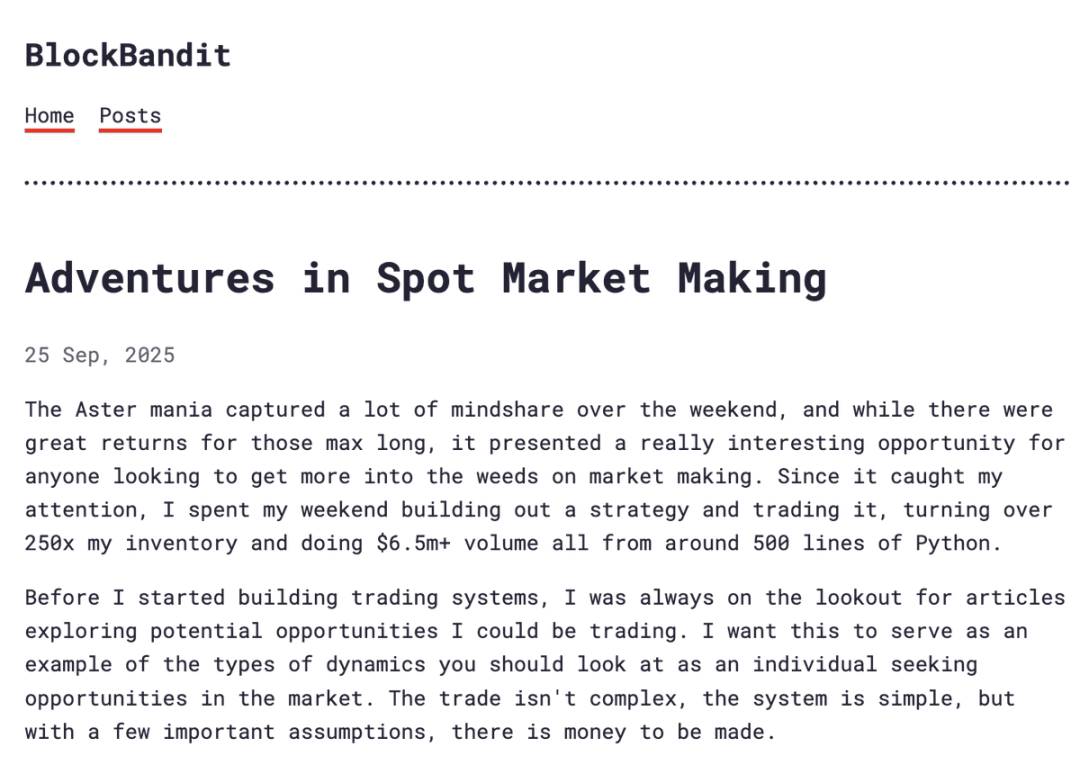
Have you seen someone make 40% overnight on ASTER using a market-making strategy?
The compounding effect of programming can be astonishing. Imagine using a directional market-making script to earn an extra 1% on every trade, using an automatic compounding tool to earn an extra 2% on every yield farm, or using a volume-boosting script to rank among the top in all points programs, or using a witch attack script to optimize airdrop yields.
More importantly, programming will force you to think systematically about the market. Code does not mix in emotions; programs do not panic sell or FOMO buy. When you convert your trading strategy into code, you must define precise parameters, specific conditions, and clear logic; just this discipline can significantly enhance your trading level.
Learn to Trade
You should try trading everything. Want to try NFTs? Maybe you are actually good at sports betting? Have you seen those new prediction markets? Did you know Logan Paul has a Pokémon card worth $5 million?
If you cannot accurately judge market direction, learn to trade spreads; if you enjoy excitement, open a 1-minute candlestick chart. I know a guy from New York who made six figures a year by buying and selling restaurant reservations.
The core idea is that everything is a market, and every market has multiple trading methods. You will never know where your advantage lies until you try it yourself. Of course, this will lead to losses; but to be honest, if you haven't lost hundreds of thousands of dollars, don't expect to make millions. The market will not teach you anything for free; you have to get used to "paying tuition."
If this is not what you want, that's fine. Just store Bitcoin in a cold wallet and let your 401k run automatically. But if you want to pursue excellence, you must learn to face the inherent risks of the market.
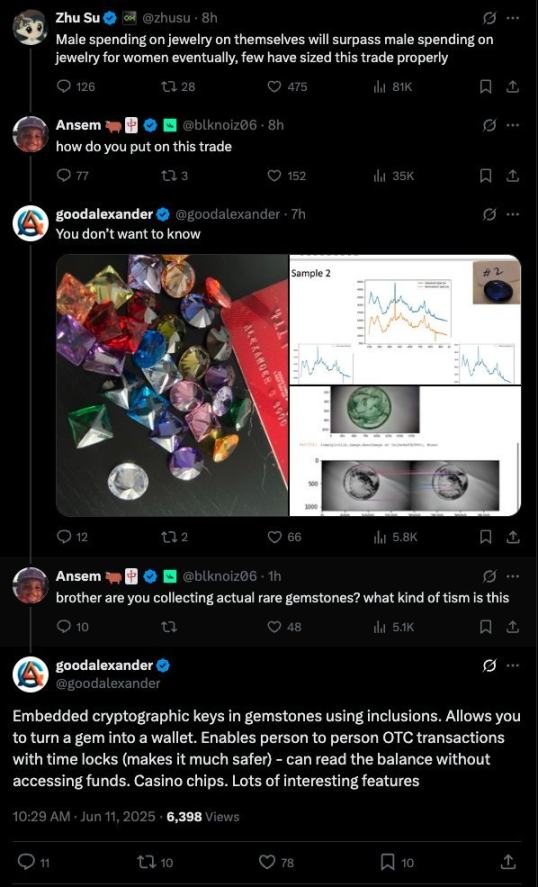
Alexander Good also trades gems on the side, which is why he is better than you.
Another benefit of broad trading is that with the variety of markets and strategies, you are likely to discover your talents in certain areas. In my view, this diversity is key to long-term market success. There is no permanent market: sometimes you cannot find any profitable strategies in the Solana ecosystem, but "when one door closes, another opens." At this point, you need to be able to adapt to shifts in market hotspots.
Cross-market proficiency can give you anti-fragility: when crypto enters a deep bear market, you can trade election prediction markets; when NFTs cool down, you can turn to collectibles; when DeFi yields compress, you can provide liquidity in the sports betting market. The game continues; the only thing that changes is the venue.
Learn to Network
The crypto space is inherently suited for building networks because it is essentially internet-native. Geography does not matter, educational background does not matter; only the quality of thought and the value you provide matter. As long as the approach is right, this is a very egalitarian field.
The key to networking is to give first, then ask. Share the tools you develop, explain complex concepts in simple language, connect others, and answer questions without expecting anything in return. Altruism is effective. The value you inject into the ecosystem will multiply back to you.
You do not have to hate small circles; if you can make friends and get invited to a few quality Telegram groups, that is enough. Build your personal brand, do not be afraid to express your opinions online, and post sincerely. Most importantly, do not turn off your DMs; you never know who might reach out to you.
If you can do networking well, you do not have to be right all the time, nor do you have to be online all the time. You can build a core group of supportive friends; trust me, everything will be much easier with help.
Conclusion
Most people will finish reading this article and return to the old path of "refreshing Twitter for the next recommendation," which is fine; the market needs exit liquidity. But for those who understand, those who realize that the crypto space rewards "the prepared," the opportunities are immense.
The infrastructure you are building now—knowledge-based, technical, and social—will yield eternal compounding. Every book you read, every script you write, and every friend you make will add to your competitive advantage.
These are the skills you need to win in this market. I know I have been cultivating these abilities, so unless you do the same, you at least cannot beat me.
免责声明:本文章仅代表作者个人观点,不代表本平台的立场和观点。本文章仅供信息分享,不构成对任何人的任何投资建议。用户与作者之间的任何争议,与本平台无关。如网页中刊载的文章或图片涉及侵权,请提供相关的权利证明和身份证明发送邮件到support@aicoin.com,本平台相关工作人员将会进行核查。




